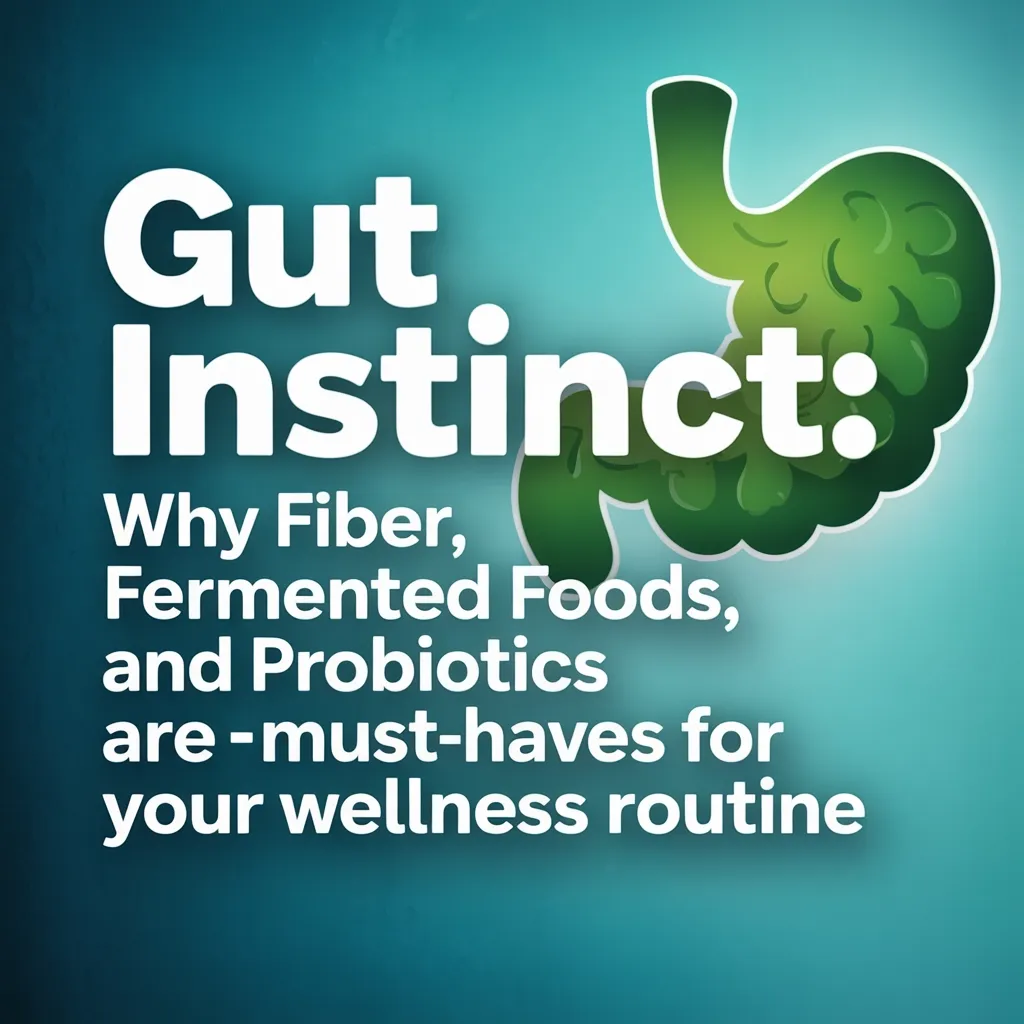Your Gut: The Foundation of Whole-Body Health
Have you ever experienced a "gut feeling" about something important? That intuitive sensation isn't just a figure of speech—it's a glimpse into the profound connection between your gut and your overall well-being. At Fugen Health in Erina, we've seen firsthand how transformative proper gut care can be for our patients' health journeys.
Your digestive tract houses trillions of microorganisms that collectively form your gut microbiome—a complex ecosystem that influences everything from your immune function and hormone balance to your mood and energy levels. When this system thrives, you thrive. When it struggles, your entire body feels the effects.
Today, we're delving into the three key factors for optimal gut health: fibre, fermented foods, and probiotics. These aren't just nutritional buzzwords—they're essential components of a wellness routine that can revolutionise how you feel every day.
Fibre: The Unsung Hero of Digestive Health
Fibre is your gut's best friend, yet most Australians consume less than half the recommended daily amount. This complex carbohydrate passes through your digestive system largely intact, performing critical functions along the way.
Types of Fibre Your Body Needs
Soluble fibre dissolves in water to form a gel-like substance that slows digestion, helping you feel fuller longer while stabilising blood sugar levels. You'll find it in:
- Oats and barley
- Legumes (beans, lentils, peas)
- Apples, citrus fruits, and berries
- Flaxseeds and chia seeds
Insoluble fibre adds bulk to stool and helps food pass more quickly through your stomach and intestines. Sources include:
- Whole grains, quinoa and buckwheat
- Nuts and seeds
- Vegetables like carrots, cucumbers, and celery
- Fruit and vegetable skins
Why Your Gut Microbes Crave Fibre
Here's where the magic happens: the fibre you eat becomes food for your beneficial gut bacteria. As these microbes feast on fibre (particularly prebiotic fibre), they produce short-chain fatty acids that:
- Reduce inflammation throughout your body
- Strengthen your intestinal barrier
- Support healthy immune function
- Regulate appetite hormones
- Improve mineral absorption

"I recommend aiming for 25-30 grams of fibre daily from whole food sources," explains Adrian Adams, Nutritionist at Fugen Health in Erina. "The diversity of your fibre sources matters just as much as the amount—each type feeds different beneficial bacteria in your gut."
While dietary fibre typically supports digestion, some individuals may experience discomfort such as bloating, heartburn, or constipation. These unexpected effects can stem from a rapid increase in fibre, personal digestive sensitivities, or conditions like IBS/SIBO. Consulting a qualified practitioner, such as those at Fugen Health Erina, can help pinpoint the cause and provide personalised guidance.
Fermented Foods: Ancient Wisdom for Modern Health
Long before refrigeration existed, humans preserved food through fermentation. This process not only extended shelf life but created nutrient powerhouses teeming with beneficial microbes. Today, we recognise these traditional foods as some of the most potent tools for gut restoration.
What Happens During Fermentation?
Fermentation occurs when microorganisms, such as bacteria, yeasts, or fungi, convert carbohydrates into alcohol or acids. These substances preserve the food while promoting the growth of beneficial probiotics. The process also:
- Increases vitamin content (particularly B vitamins)
- Makes minerals more bioavailable
- Reduces anti-nutrients that interfere with digestion
- Creates unique bioactive compounds not present in the original food
Fermented Foods From Around the World
Every culture has traditional fermented foods that have stood the test of time:
- Yogurt and kefir: Fermented dairy products rich in multiple probiotic strains
- Kimchi and sauerkraut: Fermented vegetables with distinctive flavors and probiotic benefits
- Kombucha: Fermented tea with both probiotic bacteria and beneficial yeasts
- Tempeh and miso: Fermented soy products with umami flavours and impressive nutritional profiles
"The beauty of fermented foods is that they provide living probiotics in their natural habitat, along with the perfect nutrient matrix to help them survive," notes Adrian. "At Fugen Health in Erina, we've seen remarkable improvements in digestive symptoms when clients incorporate even small amounts of fermented foods daily."

Probiotics: Your Microbial Support Team
While fermented foods naturally contain probiotics, a targeted supplemental approach may be beneficial, especially when recovering from illness, antibiotic use, or digestive disorders.
What Makes Probiotics Special?
Probiotics are live microorganisms that, when consumed in adequate amounts, confer health benefits. Unlike most supplements, probiotics aren't just nutrients—they're actual living organisms that take up temporary residence in your gut, helping to:
- Crowd out harmful bacteria
- Strengthen intestinal barrier function
- Modulate immune responses
- Produce beneficial compounds like B vitamins and vitamin K
- Assist with proper digestion and absorption
- Support regular bowel movements
Choosing the Right Probiotic Strategy
When it comes to probiotics, one size definitely doesn't fit all. Different strains have different effects:
- Lactobacillus and Bifidobacterium species are the most researched and support general digestive health
- Saccharomyces boulardii, a beneficial yeast, helps combat diarrhea and restore gut balance after antibiotics
- Spore-forming bacteria like Bacillus species can survive harsh conditions and may help with more severe digestive issues
If you're considering a probiotic supplement, consult with a nutrition professional at Fugen Health to determine the most appropriate strains and dosages for your specific needs. Look for products with:
- Guaranteed potency through the expiration date
- Appropriate storage requirements
- Research backing their effectiveness
- Species, sub-species and strains listed on the label
The Synergy Effect: Why You Need All Three
While fibre, fermented foods, and probiotics each offer standalone benefits, their true power emerges when they work together:
- Fibre feeds your beneficial bacteria, creating an environment where they can thrive
- Fermented foods introduce diverse probiotic strains that add to your microbial community
- Targeted probiotics fill specific gaps in your gut ecosystem
This three-pronged approach creates a self-reinforcing cycle of gut health that extends to every system in your body.
The Gut-Brain Connection: How Your Microbiome Affects Your Mind
Perhaps most fascinating is how your gut microbiome influences your mental health through the gut-brain axis. Research at Fugen Health in Erina shows that a balanced microbiome may help:
- Reduce anxiety and depression symptoms
- Improve stress resilience
- Enhance cognitive function
- Regulate mood and emotional processing
- Support quality sleep

Getting Started: Your 14-Day Gut Reset Plan
Ready to transform your gut health? Here's a simple week-long plan to introduce these three gut essentials:
Day 1-2: Focus on Fibre
- Add an extra serving of vegetables to lunch and dinner
- Choose whole grains instead of refined options
- Snack on fresh fruit with nuts or seeds
- Aim for 20+ grams of fibre daily
Day 3-7: Introduce Fermented Foods
Start with one fermented food introduced at a time. New one introduced every 2 days.
- Start with a tablespoon of yogurt or kefir (if dairy-tolerant)
- Try a small amount of sauerkraut with meals
- Experiment with kombucha (start with just 60ml)
- Continue your fibre focus
Day 7-14: Consider Probiotics & Combine
- Evaluate whether a probiotic supplement would benefit your specific situation
- Create meals that combine fibre-rich foods with fermented elements
- Notice how your digestion, energy, and mood are responding
- Adjust portions based on your comfort level
"The key is starting slowly," advises Adrian from Fugen Health in Erina. "Too much too soon can cause temporary digestive discomfort. Listen to your body and gradually increase amounts as tolerance improves."
Common Questions About Gut Health
Q: Will probiotics help if I'm taking antibiotics?
A: If you have digestive symptoms from the medication, absolutely. Take probiotics at least 2 hours apart from antibiotics, and continue for several weeks after finishing your prescription to help restore balance.
Q: I get bloated when I eat more fibre. Should I stop?
A: Bloating is common when suddenly increasing fibre intake. Try increasing more gradually, chewing thoroughly, cooking vegetables well initially, and staying well-hydrated. If problems persist, consult with a Fugen Health nutritionist for personalised guidance.
Q: Are all fermented foods probiotic?
A: No. Fermented foods that are pasteurised, baked, or filtered after fermentation (like many commercial beers, vinegars, and some breads) contain beneficial compounds but lack live cultures. Look for labels indicating "live," "raw," or "containing active cultures."
Your Gut Health Journey Starts Today
At Fugen Health in Erina, we believe that optimal wellness begins in the gut. By thoughtfully incorporating fibre, fermented foods, and probiotics into your daily routine, you're not just supporting your digestive system—you're investing in your entire well-being.
Remember that gut health is a journey, not a destination. Small, consistent changes yield powerful results over time. Listen to your body, adjust as needed, and celebrate the improvements you notice along the way.
Ready to take your gut health to the next level? Our team at Fugen Health specialises in personalised nutrition plans that address your unique microbiome needs. Visit our website to learn more about our approach to holistic health or to book a consultation.
Your gut has been speaking to you all along. Perhaps now is the time to listen.

